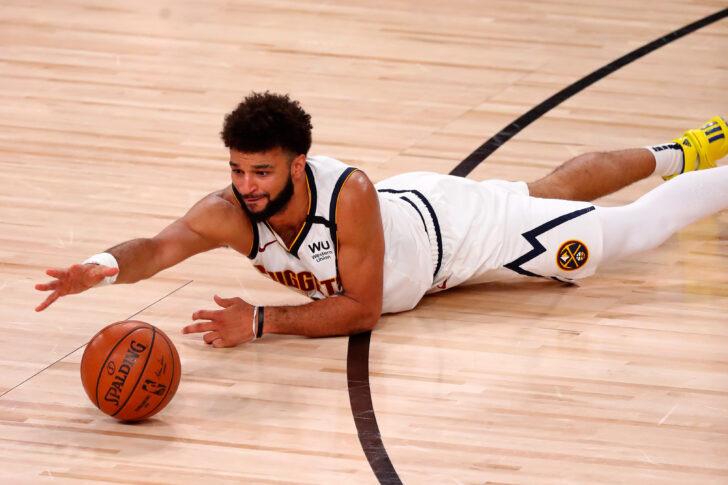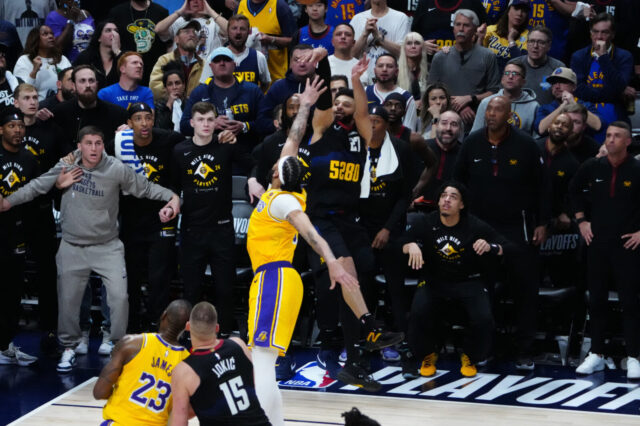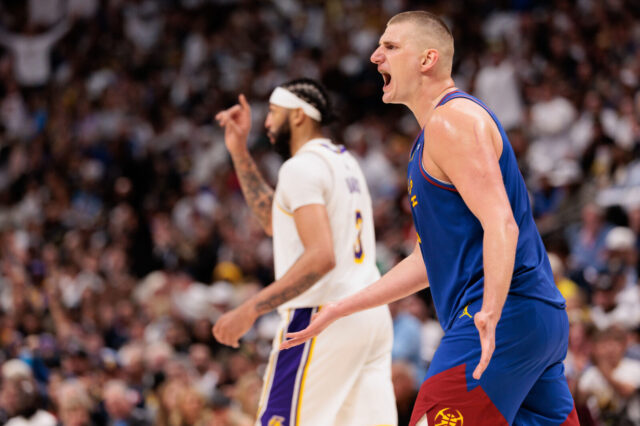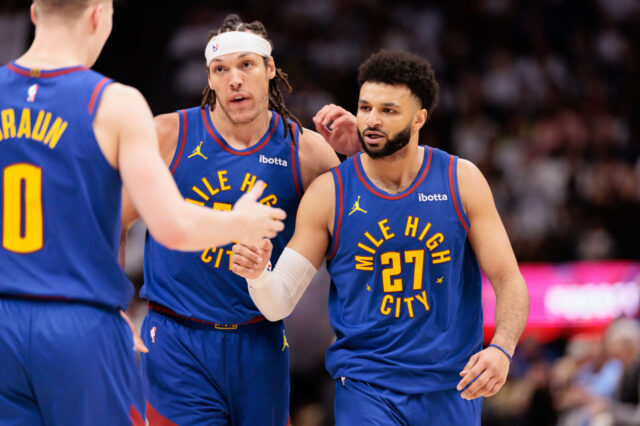Well, the Denver Nuggets took a beatdown from the Los Angeles Clippers in Game 1.
On offense, Denver’s execution got worse as the game went on and their defense just became less and less effective as time ticked off the clock. It was clear the Nuggets were exhausted after their emotional Game 7 victory over the Utah Jazz and that manifested itself in rushed offense and a lack of focus on defense.
By the time the final buzzer mercifully sounded, the Nuggets failed to eclipse the century mark and lost to Los Angeles 120-97. Still, there was much to learn from Game 1 that could pertain to the rest of the series.
Let’s dive in, shall we?
Denver’s defense has no answer for Kawhi Leonard
Well, Kawhi Leonard got whatever he wanted on offense all night long and to be honest, that was not entirely unexpected.
Leonard destroyed any and all defenders who thought it wise to take him on. Denver tried the incredibly long and athletic Jerami Grant and were completely unable to slow him. Then they went to the smaller and quicker Gary Harris and once again failed to contain Leonard. Denver then went to the savvy veteran Paul Millsap who was also scorched by Leonard. Torrey Craig also took a couple shots and had no chance to stay in front of Leonard or handle his strength.
The Nuggets guarded him straight up, put two on the ball when he called for a screen, switched when they had multiple strong wing defenders on the floor, and nothing worked.
Leonard finished with 29 points on 12-16 shooting to go with two rebounds, three assists, two steals and one block in 31 minutes of action and nothing ever looked difficult for him.
While it would seem obvious that the Nuggets need to find a way to either slow Leonard or get the ball out of his hands, they might not have any path towards accomplishing that. Leonard is too strong, too fast, and too skilled to be kept in check by this Nuggets defense and that is an unavoidable fact. Maybe they choose to throw double teams at Leonard more often, but then Marcus Morris — who had 18 points on 10 shots with four 3-pointers in Game 1 — is open beyond the three-point arc or Ivica Zubac is open under the rim.
That means Denver cannot send overly aggressive help unless Leonard uses a screen. Outright doubling when Leonard isolates will lead to far too many uncontested looks for his teammates.
Maybe Malone has an ace up his sleeve, but slowing Leonard may be an impossible task for the Nuggets.
Gary Harris rejoins starting lineup
One of the very few silver linings from the beatdown Denver took at the hands of the Clippers was the reintroduction of Harris into the starting lineup for the first time in Orlando.
That is important because, simply stated, it is necessary for Harris to start if the Nuggets want to have a chance to beat the Clippers in this series.
Without Harris starting, Denver would have two other choices: Monte Morris or Torrey Craig.
If Denver started Morris as they did against the Jazz, they would not have the personnel to deal with the Clippers bench unit. Morris has the defensive capability of making life more difficult for Lou Williams or Reggie Jackson and he also thrives grabbing steals in passing lanes. Morris also has the offensive skillset to attack Williams and Jackson’s lackluster defense on the other end of the floor. That makes Morris an important weapon off the bench for Denver.
If Craig started instead of Harris, Denver has more issues to contend with. Los Angeles would be able to play off of him when the Nuggets are on offense because of Craig’s struggles shooting the ball. To make matters worse, the Clippers would also be able to overload the strong side of the court knowing that Craig struggles to attack defenses off the dribble and create for others. Not having a playmaker on the weak side of the floor as an escape route makes the Nuggets offense predictable and slow in the past. Also, Craig has not been stellar on defense which means he is not making up for his struggles on offense with strong defense.
With Harris starting instead, many of these issues are addressed in some fashion. Harris is not as equipped to run side pick and rolls as Morris is, but he still has the capability of calling for a screen and creating offense. Harris is not as big as Craig, but his defensive impact is similar, if not better. Harris is still getting his legs back which has manifested itself in bad shooting performances, but he is still just as threatening, if not more threatening, as a shooter than Craig is. Oh, and Harris has tons of experience guarding the likes of Paul George and Kawhi Leonard.
Getting Harris up to speed early on in the series is a smart decision by Malone. Hopefully it pays dividends sooner rather than later if the Nuggets want to find a way to win the series.
Nikola Jokic — not Jamal Murray — is going to have to lead the Nuggets offense against the Clippers
Jamal Murray is getting so much attention from the Clippers and it is making life incredibly difficult for him offensively.
The Clippers deploying Patrick Beverley, Paul George, or Kawhi Leonard to defend Murray has predictably slowed his scoring, but the real issue is not in who is guarding him one-on-one. The real issue is the Clippers team defense being coincidentally and uniquely equipped to slow Murray.
Think of it this way. If Murray was being defended by Leonard and the rest of the Clippers roster was full of average defenders, there would be a multitude of counters to help make Murray’s shots come easier. They could use guard-on-guard screens to get a switch or run traditional pick and rolls with Jokic to force Leonard to fight over screens. But against this Clippers team, even if Murray gets Leonard to switch off of him, it’s one of Beverley, George, Morris or Zubac switching onto him. None of those matchups are advantageous to productive offensive performance from Murray.
That means Nikola Jokic has to be the initiator of the offense to allow Murray to play more of an off-ball role.
Jokic has all of the ability to absolutely demolish any of the Clippers big men down low. If Jokic comes out of the gates in the first quarter of Game 2 taking it directly into the paint and scoring on the Clippers defense, he will force them to adjust their game plan. If Jokic does that, the Clippers will likely start to double which allows the Nuggets to swing the ball to the open shooter and keep the Clippers defense scrambling.
That is not the only impact Jokic being more aggresive would have. Jokic dominating in the paint will lead to him drawing more and more attention from the rest of the Clippers defenders. More attention on Jokic means less attention on Murray. Pulling the attention from Murray to Jokic will help spread the floor which creates more room for Murray to operate as a secondary creator, more passing lanes for Jokic to find shooters, and more room for cutters to get in front of the rim.
Jokic was not aggressive enough in Game 1. If the Nuggets are to even the series, he is going to have to turn up the intensity and urgency on offense in Game 2 and force the Clippers to adjust.
Denver’s bench unit struggles against Clippers’ reserves
If the Nuggets are solely relying on winning with their starting unit against the Clippers, Denver is in a truly terrible spot.
The Nuggets need to find a way to win the battle of the bench units, but in Game 1, that battle was won by the Clippers. With the entire fourth quarter being garbage time with no impact on the outcome of the game, we are going to throw out those stats and instead look at quarters one through three.
In quarters one through three, Denver only had a total of 10 bench points. Los Angeles was not much better with just 13 of their points coming from their reserves through three quarters, but Denver cannot lose that battle if they hope to win the war.
Morris has the ability on both ends of the floor to exploit Reggie Jackson. Michael Porter Jr. should be a difference maker as a scorer being that no one on the Clippers bench can match his size and skill. Harrell is no where near and all-world defender either so there is not a true rim protector to contend with. For the Nuggets to struggle to score in the way they did when the game was still on the line is extremely concerning.
Unless the Nuggets get better performances from both Morris and Porter, their margin of error is even thinner than originally thought.
If the Nuggets want to limit the Clippers offense, they must slow them down
So many of the Clippers easy baskets occurred because of the Nuggets struggles defending in transition.
Yes, I can already hear people yelling about how Los Angeles only had eight fast break points, but only allowing a few fast break points does not equate to good transition defense.
The biggest issue Denver had was getting cross-matched in transition which immediately gave the Clippers an advantage to start their offensive possession with.
Let’s explain with some film.
In the clip above, Murray is just a tad slow getting back on defense so he is forced to pick up Leonard instead of Beverley. That meant Millsap had to defend Beverley, but he also had to provide help defense.
Whether Millsap blew the coverage and should have let Jokic be the help defender or if he was just stuck guarding too much space is irrelevant. The reason the issue arose was because Denver failed to get back on defense quickly and decisively enough which in turn made it easier for the Clippers to create open looks. If Murray was on Beverley and Millsap was on Leonard, Denver would be spaced correctly and the breakdown in communication would have never taken place.
So while the Nuggets were not giving up many points in transition, they were giving still giving the advantage to Los Angeles which then manifested itself in the Clippers half-court offense. If the Nuggets want to try and contain this Clippers team, they need to be able to matchup the way they want to in order to maximize their potential on that end of the floor.
The Nuggets will have to be much more crisp in their transition defense if they hope to make scoring tougher on the Clippers. Otherwise it will be a layup line as it was in Game 1.



